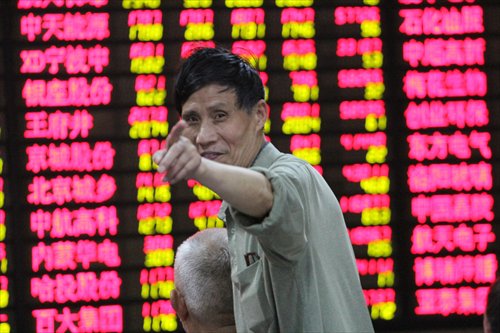A shares soar on MSCI speculation
New trading rules seen boosting confidence

Investors check share prices at a brokerage in Nanjing, East China's Jiangsu Province on Tuesday. Photo: CFP
China's A-share market jumped by over 3 percent on Tuesday, the biggest daily gain in nearly three months, which experts said was fueled by speculation that MSCI will soon include A shares in its indexes for the first time.
The benchmark Shanghai Composite Index jumped 3.34 percent on Tuesday and the Shenzhen Component Index climbed 4 percent.
The total trading volume on the Shanghai and Shenzhen exchanges doubled to 631.5 billion yuan ($95.92billion) from the previous trading day.
New rules released
Tuesday's surge was largely thanks to continued foreign fund inflows into China's A shares, according to Qiu Yanying, partner and chief strategist at VStone Asset Management Co.
"Investors are betting that China's A shares will soon be included in the MSCI Emerging Market Index," he told the Global Times on Tuesday.
Qiu's view was widely shared in the market. Global investment bank Goldman Sachs on Tuesday raised the probability of China's mainland market being included by MSCI to 70 percent, up from 50 percent in April, citing new rules launched by China's market regulator recently, Bloomberg reported on Tuesday.
On Friday, the Shanghai and Shenzhen stock exchanges announced new rules requiring that listed companies that are planning major asset restructuring should not stop trading for more than three months, and those that are undertaking private placements cannot stop trading for more than one month, according to notices posted on the websites of the two bourses late on Friday.
"The new rules have been widely interpreted as being part of the Chinese government's efforts to eliminate obstacles that prevent A shares being included by MSCI," Yan Hong, professor of finance with the Shanghai Advanced Institute of Finance (SAIF) at Shanghai Jiao Tong University, told the Global Times on Tuesday.
Yan noted that it could also relieve international investors' anxiety about the risks from imperfect rules in the A-share market.
"International investors have long criticized the mechanism for trading suspension in the A-share market, especially last summer when more than 1,000 mainland-listed companies simply halted trading during the market volatility without giving reasonable explanations," he said
Yan also noted that the new rules would inhibit listed companies from using asset reorganization to manipulate stock prices, and this will "protect investors."
Qiu agreed with Yan. "The new rules can raise the possibility of mainland stocks being included by MSCI," he said, adding that international investors pay close attention to liquidity, which can be greatly influenced by non-standard trading suspensions.
The market has widely viewed being included by MSCI as a big potential positive for China's A shares.
"It can help bring advanced investment philosophies and more funds into the A-share market, which can aid liquidity and reasonable stock pricing," he noted.
The inclusion could bring in $16.5 billion in incremental funds from international investors, Li Lifeng, a stock market analyst at Sinolink Securities, was quoted as saying by Guangzhou Daily on Tuesday.
But Yan from SAIF also cautioned that investors should not count on the inclusion too strongly.
"The inclusion can help enhance reasonable stock pricing, but can't ensure a high stock price," he said.
Besides the increased optimism about MSCI inclusion, the Shenzhen-Hong Kong Stock Connect plan is also viewed as another influential factor in reviving the mainland market on Tuesday.
"China is likely to launch the Shenzhen-Hong Kong Stock Connect scheme before MSCI makes a decision whether to include A shares or not," ifeng.com reported on Tuesday, citing a report by Societe Generale.
There has been a net inflow of funds from abroad into mainland stocks for 11 consecutive days, with a total net inflow of more than 9 billion yuan, news portal cs.com.cn reported on Monday.
The foreign funds are also an important factor in boosting A shares, said Qiu from VStone, adding that by year's end, the major indexes are likely to be higher than they are now. "There are fundamentals to support blue-chips, which are the pillar for the A-share market."